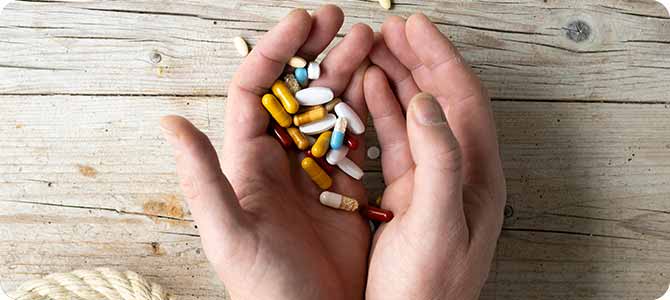Stimulant Addiction Treatment Q&A
Stimulant addiction is a severe condition characterized by persistent cravings and drug use, causing physical and psychological symptoms like heightened energy, agitation, delusions, weight loss, rapid heartbeat, and sleep disturbances. Our team at Psychiatry of the Palm Beaches provides comprehensive care and treatment options for sustained recovery. For more information, contact us today or book an appointment online. We have convenient locations to serve you in Vero Beach, Jacksonville, Boynton Beach, Palm Beach Gardens, Stuart, Royal Palm Beach, Port St. Lucie, Melbourne, Fort Lauderdale, and Jupiter, FL.


Table of Contents:
What is stimulant addiction?
What are the signs and symptoms of stimulant addiction?
How is stimulant addiction diagnosed?
What treatment options are available for stimulant addiction?
At Psychiatry of the Palm Beaches, we are dedicated to helping individuals understand and overcome stimulant addiction. We realize that stimulant addiction is a growing issue, not just in our community but globally, affecting people from all walks of life. Stimulant addiction is a multifaceted disorder that can be a consequence of the aberrant consumption of substances like cocaine, methamphetamine, and even prescribed medications.
We believe that addiction is a complex disorder that requires a multifaceted approach. Our qualified psychiatrists provide customized treatment regimens that address both the medical and psychological aspects of addiction, assisting clients on their path toward wellness.
Our approach goes beyond just managing withdrawal symptoms. We incorporate cognitive-behavioral therapy and contingency management to help individuals change their addictive behaviors and develop coping mechanisms. When necessary, medication-assisted treatment is used to alleviate withdrawal symptoms, and cravings, and manage co-occurring mental health disorders.
We also understand the value of a supportive environment in the recovery journey. That’s why we encourage participation in support groups where experiences can be shared and lessons learned from others in recovery.
We are committed to helping individuals achieve recovery from stimulant addiction. We believe that with early detection, proper treatment, and ongoing support, individuals can regain control over their lives, rebuild their relationships, and achieve long-term sobriety.
At Psychiatry of the Palm Beaches, we understand the complexities of stimulant addiction and its profound effects on a person’s physical, mental, and behavioral health. We are well-equipped to handle, with a team of experienced psychiatrists and professionals who have a deep understanding of the physical signs such as hyperactivity, disrupted sleep patterns, significant weight loss, increased body temperature, irregular heart rate, and high blood pressure.
We also understand the mental and emotional turmoil that stimulant addiction can cause, including feelings of paranoia, anxiety, mood swings, and difficulty concentrating. Behavioral changes such as social withdrawal, neglect of responsibilities, and a compulsive need to use stimulants are also key indicators of addiction that we pay close attention to. Our team is skilled at helping patients navigate through these challenges, guiding them toward healthier behaviors and coping mechanisms.
Recognizing and understanding the progression of stimulant addiction, including the building of tolerance and the risk of overdose, is critical. Our experts are here to provide immediate medical intervention when necessary and help patients gradually step down their usage safely.
Psychiatry of the Palm Beaches specializes in the diagnosis of stimulant addiction, a meticulous process that involves a wide-ranging evaluation by our team of medical professionals. This evaluation is comprehensive, considering various aspects of the patient’s condition, from substance use patterns to their physical and mental health status and their social and environmental circumstances.
The first step in our practice is an initial screening to ascertain the presence of stimulant use. Our health professionals will conduct a detailed interview about the patient’s substance use history, including the type and quantity of stimulants used, along with the frequency, duration, and intensity of consumption. We also work on identifying any associated withdrawal symptoms or signs of tolerance development.
Next, our medical team conducts a detailed physical examination to identify any physiological effects of stimulant use, which may include cardiovascular or neurological complications, such as rapid heart rate, high blood pressure, dilated pupils, or sudden weight loss. We may also prescribe blood tests or other laboratory tests to detect the presence of stimulants in the patient’s system.
Following this, a comprehensive psychiatric evaluation is carried out by our psychiatrists, which is pivotal in diagnosing stimulant addiction. We assess the patient’s mental health to identify symptoms of addiction such as cravings, compulsive use, impaired control, and neglect of responsibilities or hobbies. We also screen for co-occurring mental health conditions that may contribute to or be exacerbated by the addiction.
Lastly, our health professionals will assess the patient’s social and environmental circumstances. This includes an evaluation of the impact of stimulant use on the patient’s relationships, work performance, family dynamics, access to treatment resources, and day-to-day activities.
At Psychiatry of the Palm Beaches, we understand that stimulant addiction is a complex disorder that requires a tailored approach to treatment. Our team of dedicated experts is committed to providing comprehensive treatment that addresses the multifaceted nature of this condition, encompassing both physical and mental health aspects.
Detoxification and Medical Supervision
The first step in recovery often involves detoxification, a process of eliminating harmful substances from the body. Our qualified healthcare providers oversee this critical phase, ensuring patient safety and comfort while managing withdrawal symptoms through medical intervention. This medically supervised approach minimizes risks and promotes a smooth transition into the next stage of treatment.
Behavioral Therapies
Once the detoxification process is complete, our specialists employ a variety of behavioral therapies to support ongoing recovery. These evidence-based approaches help patients develop coping skills, manage cravings, and prevent relapse.
Cognitive Behavioral Therapy (CBT)
Cognitive Behavioral Therapy (CBT) is a therapy approach that focuses on recognizing and modifying dysfunctional cognitive models that contribute to substance misuse. By teaching patients how to recognize and challenge harmful thought patterns, we can help them establish more beneficial coping strategies.
Prescribed Medications
In some cases, our psychiatrists prescribe medications to manage withdrawal symptoms, reduce cravings, or treat co-occurring mental health disorders. These can include stimulant medications, mood stabilizers, or antidepressants, depending on the patient’s specific needs.
At Psychiatry of the Palm Beaches, we understand that recovery from stimulant addiction is a long-term process requiring ongoing support and care. For more information, contact us today or book an appointment online. We serve patients from Boynton Beach FL, Delray Beach FL, Palm Beach Gardens FL, Jupiter FL, Stuart FL, Palm City FL, Royal Palm Beach FL, Wellington FL, Vero Beach FL, Citrus Ridge FL, Jacksonville FL, Riverside FL, Port St. Lucie FL, Beau Rivage West FL, Melbourne FL, Palm Bay FL, Fort Lauderdale FL, Hollywood FL, Jupiter FL, North Palm Beach FL, and surrounding areas.


Additional Services You May Need
▸ Mental Wellness
▸ Relationship Coaching
▸ Depression and Mood Disorders
▸ Women’s Health
▸ Panic Disorder
▸ Medications Management
▸ Men’s Health
▸ Individual Psychotherapy
▸ Bipolar
▸ ADHD
▸ Geriatric Mental Health
▸ Life Coaching
▸ Couple’s Counseling
▸ Obsessive Compulsive Disorder
▸ Social Phobia Treatment
▸ Eating Disorders
▸ Post Traumatic Stress Disorder
▸ Psychotic Disorders


